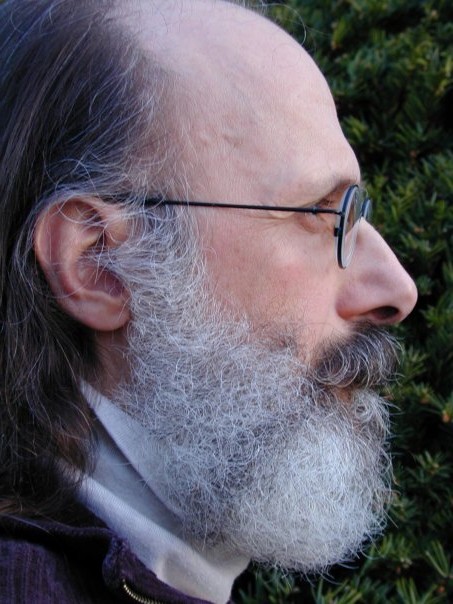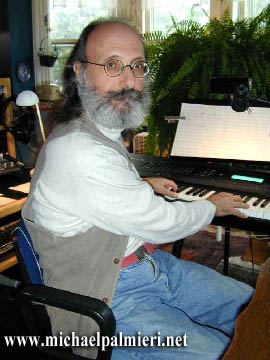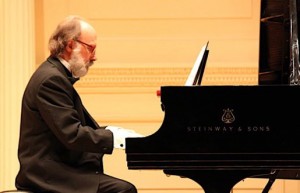Music
Michael Palmieri

“I can remember practicing when I was about six years old and thinking, if I could just do this for the rest of my life, I’d be perfectly happy.” ~Michael Palmieri
Incredible New with Old
Dawn Bonner
Born: Michael Palmieri
May 12, 1947
Birthplace: New York, New York
It’s a new year, so it seems fitting to show a new way of creating music reminiscent of the 1800s. Music is a passion for many, computers a passion for others and when the two meet–incredible things happen. Michael Palmieri, referred to as a musician’s musician, a noted composer of modern concert music with hundreds of original compositions, and a teacher extraordinaire has put together a computer generated system, which assists him in creating modern day symphonic music.
Computers also assist Palmieri in being one of the most played contemporary classical composers of today. His music is streamed throughout the world over the Internet hundreds of times daily.
Tool Box
He records his music in his studio with:
Kurzweil K2500 keyboard, including multiple libraries of realistic acoustic and electronic samples.
Moog Little Phatty analog synthesizer.
Roland XV-5050 module, with
Symphonic String samples.
NI Pro53 software emulation of
Sequential Circuits’ Prophet 5 Synthesizer.
Synthology Ivory, 40 GB of Bosendorfer, Steinway and Yamaha Grand piano samples.
Access Virus PowerCore SoftSynth, and a half dozen other software synths.
Plus
The studio has an arsenal of cutting-edge hi tech gear.
Uses a Mac G4 Quad computer fully loaded with RAM, with a separate HD for audio files.
Composes using Sibelius a notation software.
Records using Motu Digital Performer a midi/audio/effects software.
Uses t.c. electronic PowerCore Compact hardware for plug-ins, effects and mastering.
Mackie HR824 high resolution studio monitors.
MOTU 2408 audio interface and a Mackie 1202-VLZ mixer.
Palmieri has been composing and playing music for 57 years, which may make one think he would be doing things by rote. Not so.
How this Musical Collaboration Began
He said, “About 15 years ago I developed tendinitis in my arms and hands, which put an end to my playing career. It was also a physical and psychological trauma to deal with the fact I wouldn’t be playing and for many years I couldn’t practice the way I was used to (five to eight hours a day). Until about 12 years ago, before I had access to computer technology, all my music was written by hand and performed by live musicians. Life with computer technology has completely changed my outlook, my output, and the distribution of the music.”
The computer world opened a new door for Palmieri in his lifelong love, passion, and career. One in which he has done well in. His fervor for music pushed him to a new way of composing.
“I have been with it since I was four years old, I wouldn’t know what to do without it. I started creating original music as a very young child,” said Palmieri.
“Let me say,” he continued, “I absolutely love live music. But I am also over the top with joy having and using computer technology to produce my music.”
Changed His Outlook and Career
“I spent my life convincing players and ensembles to request a new composition. When I received a commission, after writing the music and spending months copying out parts by hand, I would hear the piece possibly once,” he said.
“The computer and its dedicated gear are now MY instrument,” he said.
The table to the right is a list of Palmieri’s arsenal to make music for our ear’s delight. It has empowered him to continue on with his life’s work, luckily for us. His work can be moody, dark, light, twinkly, complex, simple, fun, and at times brings you back to the good old Beethoven days.
Genre
When asked the genre of his music and how he classifies it, he said, “I don’t. The Internet does. The genre that the music best fits into is “contemporary classical”. The word Classical doesn’t work. The problem is–none can agree on a suitable replacement for it. I understand that the world at large, for lack of a better word, refers to this music as Classical.”
“In academia there is an unspoken agreement that–no one really knows what to call this music. Some try calling it Serious music. This term pompously connotes that other types of music are not equally serious. Others call it Concert music. But, certainly Rock music is performed in concert. To me it’s a matter of semantics. But, Classical ain’t the right word to describe all this music that has evolved, from one form to another, over the past 600 to 700 years, and still continues to do so,” he finished.
Do What You Love, the Money Will Follow
Palmieri composes, plays, and teaches. It is always a joy to see someone follow their dream and do what makes their heart sing. Palmieri reminds me of Nicholas Pavloff who started photography as a young boy and no matter what the industry threw at him, he landed on his feet and always made a living with his passion. Palmieri has done the same in the music industry.
Palmieri said, “I love what I do. I think it is the secret to life. The secret of life is to find out what you love and find out how to make money doing what you love. I am a very sought after, reputable piano teacher who has had his students play for 27 years at Carnegie hall, I have worked very little for 27 years and made very good money. Before that, for 30 years I was very sought after as a freelance musician, in and around New York City, with everyone and everbody at 18. I had 28 jobs the month of December.”
“As a teenager, I wrote original music and orchestrated music for bands that I worked with. I had most inspiring composition teachers, including a Pulitzer award winning composer, a Tony award winning legendary arranger and the musicologist who wrote the book on Fugue. So, one need not wonder why I enjoy including fugues in much of my work,” he said.
His Accomplishments
Palmieri has created numerous pieces for major performers including the Baltimore Symphony and the San Antonio Symphony Orchestras. Also, the government of Norway presented him with a grant to create and record a symphonic accompaniment of a patriotic song recorded with chorus.
Palmieri composed many piano pieces for himself, as well as for other people’s professional performances, and is the author of Student Piano Pieces. Which is a collection of music written for and performed by his pupils. He orchestrates music for live performances and produces background tracks for professional recordings.
In addition to solo performances, he played with virtuoso musicians and singers including major show business figures. His assignments encompassed classical, ethnic, popular, Broadway, jazz, and rock music.
He said, “Although I am now primarily a composer and teacher, until about 15 ago, I spent 30 years working as a freelance musician in and around NYC, playing whatever and wherever I was hired to play. Each job was diverse. It ranged from being the pianist for a swing band, to playing pipe organ, to playing for eight years as the accordionist at the now defunct, but infamous Mama Leone Restaurant.”
Palmieri’s teaching ability and know-how have been influenced by his experiences teaching courses in keyboard harmony and ear training in the music theory department at Penn State University, teaching music in public schools, as well as teaching as an independent music instructor since 1976. Drawing from various sources, he forged his own teaching method. Throughout his career, innumerable students have evolved into both acclaimed musicians, as well as fulfilled musical hobbyists.
News clips say, “He has developed a unique and extensive program of music learning.”
His Band
The Electric Alligator Ensemble performs his music live. The band is a three member electronic keyboard ensemble.
“Playing along with me in The Electric Alligator Ensemble is a former pupil, concert pianist, music educator, published author on music pedagogy, and long time associate, Ralph Iossa, and a current pupil and prize-winning virtuoso pianist extraordinare, Emma. We play all of the electronic music live, the electronic music is very difficult to play, we have rehearsed for two years to put together a two hour program.” He added, “We take pride in presenting this out-of-the-ordinary music in out-of-the-ordinary venues such as colleges, planetariums, churches, schools, shopping malls, libraries, etcetera. I would like to be able to play some really off beat places.”
Where You Can See Him and/or Hear Him
For 27 years he has presented concerts displaying the achievements of his pupils at Weill Recital Hall at Carnegie Hall. This annual event will be listed The New York Times, New York Magazine, as well as other major newspapers. Local newspapers carry stories about his students and their accomplishments. Currently, the date for Carnegie Hall is set for June 13, 2009.
Music from his CD Fantasy is broadcast on numerous radio stations throughout the U.S. and Canada.
Palmieri said, “Right now I am working on a really big repertoire of two hours of Michael Palmieri music. It will be a while before it comes. I practice one hour to 45 minutes twice a day, I have to know where my limits are so I don’t hurt myself. I just can’t wait to sit down and open up a piece of Bethoven’s music and find out what he is up to. I am putting together original music to play at people’s salons, homes, not my electronic music, but my solo piano music that I would play. I can’t obsess on it like I used to.”
He persists in influencing this generation’s musicians, teachers and composers. Information about Michael Palmieri and his music is available on his website.
The Details of Composing
Palmieri explains about his music and how being a computer literate composer works. He said, “For many, many years, I went around knocking on doors trying to get live performers to play my music; symphony orchestras, brass quartets…or to give me a reason to write a new piece of music. If I got a commission to write a new piece of music, I would work on the new piece of music on my couch for six months. It was impossible to hear the music at the time when writing for a six piece symphony orchestra. After years and years of doing this and discovering this technology, I decided rather than seeking out performers, I am going to write music for my computer (it may only be played once and not recorded).”
“Twelve years ago I never even touched a computer. I write the stuff, I record the stuff, and an audio engineer helps me to record my stuff. All of it was written and played by the computer, which is very different from how a performer operates. Also, very different from how today’s composer composes in today’s Internet world.”
Some people don’t leven know middle C or know how to write a middle C on note paper. Some people have sophisticated software like I have and never even knew how to write music. That is not the way I do it, I write it right on a computer screen on a note piece of music paper. Now that I know what I am doing and how to use this stuff, the plus side is I can hear whatever I write. I can hear it play back exactly for the instrument I played it for, a trumpet…a violin, sounds like a violin. When I described to you sitting on my couch for six months writing the music and not being able to hear it until it was performed, now I can hear it.”
“The notation software I write with is the first step. I work everything out the way Beethoven and Bach would have worked things out, except for technology. The music notations software is really designed for people who want to print out the music and give it to live performers. I had to write out all twelve parts by hand, now I click on a menu and can print them out on my printer or turn them into a PDF and email it. When I write for an actual live brass quintet or my students, this notation is handy to use. I use it in other ways.
Personally Involved
“I live in a lovely old Victorian home with my garden. I am obsessed with my garden and the creative stuff that happens at the garden. I love Museum of Modern Art and a few weeks ago we saw Dahli’s Life, and Louise Bogiwa. As far as being a photographer, I am just a simple man, I have one of the original digital cameras without a zoom lens. I snap 200 pictures, edit out the 15 that look good, and know how to crop them. All I really want to do is document the many fleeting moments in the garden, it is forever changing. The garden, my students, and the museums all inspire my music compositions,” said the simple man; the simply talented author, composer, musician, teacher, photographer, and gardener.
Tagged Michael Palmieri, music




john andersonJuly 13, 2013 at 7:47 am
dig this article, enjoy music of all types. always fun to find new music and new ways of making it. thanx for an interesting article. looked the dude up on facebook and found more of his music on his page.
nice to see an article that’s written in an educated manner that has depth, tired of the shallowness of many articles that tell me more about assumptions than a real person.
here’s mike’s fb page
https://www.facebook.com/michael.palmieri.96
(posted it in the website spot cuz it may not link in the comment)